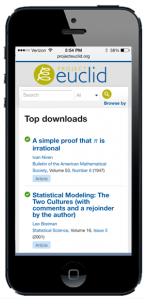Project Euclid Launches New Website
Project Euclid launched a new website in early January. Planning, design, and development of the site took place over 18 months, and included discussions with numerous researchers, publishers, and librarians. The new site maintains what people liked about the previous site, its performance and clean appearance, while incorporating many new tools and features.
Project Euclid is a not-for-profit, academically owned and operated initiative that provides electronic hosting, marketing, and sales services to publishers of mathematics and statistics literature. CUL conceived of and began developing Project Euclid in 1999-2000, and the Library ran the system for eight years on its own. Since 2008, Project Euclid has been jointly operated by Cornell University Library and Duke University Press. CUL maintains the technical infrastructure, and DUP handles customer-facing services like marketing and sales. Project Euclid currently hosts some 80 international publications, most of which are journals but with a growing book and conference series component. The initiative is completely self-supporting.
Project Euclid benefits greatly from other CUL activities, and this was especially true of the site redesign. Melissa Wallace, a DSPS web designer, designed the new site and brought to it many of the design considerations learned from CUL’s Discovery and Access efforts over the last several years. Shinwoo Kim and Martin Lessmeister, CUL-IT developers, helped implement new technologies in Euclid that are also being incorporated into the new Library discovery environment, as well as lessons learned from running arXiv.org. Both Martin and Shinwoo also bring along years of experience with the system behind Euclid.
What are some of the new features of the redesigned Project Euclid website?
A new search and discovery tool. With this version of the website, Project Euclid introduced faceted searching. While research libraries are increasingly implementing this technology, it is still relatively new to academic content sites. Its use in Project Euclid represents a powerful new tool for navigating over 1.7 million pages of scholarship.
Table of contents (TOC) alerts. Project Euclid has offered RSS alerting services for several years, but users can now register to receive an email with the table of contents of a journal issue when that issue appears on the website. Users manage their TOC alerts through personal MyEuclid accounts, easily created by anyone.
Citation export. On TOC and search results pages, users may select one or more articles and export citation information in BibTeX, RIS, or a printer-ready format. RIS is a bibliographic format that many citation management tools are capable of importing (e.g., EndNote, RefWorks, Zotero, and others).
Mobile interface. The new website implements responsive design, which automatically optimizes the site appropriately for a variety of mobile devices. This allows users to read and work on Project Euclid more comfortably and effectively as they access content from multiple devices.
Top downloads. We now display a list of top downloaded documents on a number of Project Euclid pages. The lists are calculated in the same manner throughout the site: the top five downloaded articles or chapters over the previous seven days. These lists attempt to give some sense of user download trends and are recalculated every day. Any particular list displayed is appropriate for the viewer’s context within the website. On a journal home page, the top downloads are all from that journal. On a publisher’s page, they could be from any publication of that publisher. On the Project Euclid home page, the top downloads are measured across all content in the system.
“More like this.” When a user views an article or chapter page, Project Euclid presents a list of similar documents, using the viewed item as the basis for evaluating similarity.
Other changes and added features to the new Project Euclid website include: wider implementation of MathJax (a display technology for mathematical expressions); branded publisher landing pages; links to social media; access indicators for all content; extended print-on-demand offerings; and remote login (via Shibboleth), for off-campus access.
Project Euclid welcomes your feedback on the new site and suggestions for further improvement. All pages have a “site feedback” link in the lower right.
–David Ruddy
